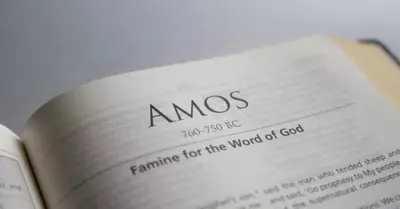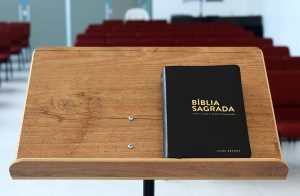The book of Amos may
Where Is the Book of Amos in the Bible?
- The book of Amos is in the Old Testament. It is one of the twelve books of the Minor Prophets.
- In the biblical timeline, Amos prophesied after Israel had split in two, during the reigns of Uzziah over Judah and Jeroboam II over Israel. Their reigns are recorded in 2 Kings 15:1-7 and 2 Chronicles 26 for Uzziah and 2 Kings 14:23-29 for Jeroboam II.
- This was a time of political and financial prosperity for both kingdoms. However, they were times of moral bankruptcy. 2 Kings 14:24 records that Jeroboam II “did evil in the eyes of the LORD,” and 2 Chronicles 26:16-21 records how Uzziah was struck with leprosy as punishment for his sin and pride.
- Amos prophesied during this time of physical bounty and spiritual famine.
- Who Was Amos?
- The book of Amos doesn’t give a lot of information about Amos himself. Instead, it’s focused on delivering the word of God.
- However, we do know some things about Amos. He was from Tekoa, a small Judean town south of Bethlehem. He worked as a shepherd and took care of fig-trees, according to Amos 1:1 and Amos 7:14-15.
- We don’t know much about Amos’ social status, whether he owned flocks and groves or simply worked as a hired hand, but his depth of knowledge and word choice in the book suggest that he was educated.
- Though he lived in the southern kingdom of Judah, he was sent to the northern kingdom of Israel to prophesy.
- What Is the Book of Amos about?
- The book of Amos is a book of prophecy. In it, the Lord speaks through Amos to let Israel and other nations know what they’re doing wrong, what will happen to them as a result of that sin, and what His eventual plan is to bring them back. Amos predicts events such as Israel’s exile (e.g., Amos 5:27).
- The book follows a general structure:
- Introduction in Amos 1:1-2
- Oracles against the nations, including Judah, Israel, and the surrounding nations in Amos 1:3–Amos 2:16
- Oracles against Israel specifically in Amos 3:1–Amos 5:17
- Announcements of exile for Israel in Amos 5:18–Amos 6:14
- Visions of divine retribution, with metaphors and word pictures for God’s judgment in Amos 7:1–Amos 9:10
- Promises of restoration and Israel’s blessed future in Amos 9:11-15
- The structure is broken down further in this entry in Bible Study Tools.
- There are two main themes in Amos. The first theme is that of true worship. In this time of prosperity, some did give lip service to God, but He was displeased. In Amos 5:21-24, God declares,
- “I hate, I despise your religious festivals; your assemblies are a stench to me. Even though you bring me burnt offerings and grain offerings, I will not accept them. Though you bring choice fellowship offerings, I will have no regard for them. Away with the noise of your songs! I will not listen to the music of your harps. But let justice roll on like a river, righteousness like a never-failing stream!”
- The Lord despised their showy worship and desired true righteousness. This brings us to the second theme of Amos: justice. If one verse could sum up the message of Amos, it might be Amos 5:24, “But let justice roll on like a river, righteousness like a never-failing stream!”
- 5 Reasons You Should Read the Book of Amos
- Amos spoke to a materially prosperous society that struggled with true justice and righteousness, instead of settling for outer displays of worship while oppressing the poor and downtrodden. There is much in the book that we can learn today.
- The Book of Amos Addresses Materialism
- The book of Amos contains some brutally blunt statements from God, especially against the materialistic culture thriving in Israel. With the materialism and consumerism that often characterizes modern society, we would do well to consider what the book of Amos has to say.
- “You put off the day of disaster and bring near a reign of terror. You lie on beds adorned with ivory and lounge on your couches. You dine on choice lambs and fattened calves. You strum away on your harps like David and improvise on musical instruments. You drink wine by the bowlful and use the finest lotions, but you do not grieve over the ruin of Joseph. Therefore you will be among the first to go into exile; your feasting and lounging will end” (Amos 6:3-7).
- The Lord’s disgust with the materialism and the lack of concern for worship or justice is expressed even more harshly in Amos 4:1-2, “Hear this word, you cows of Bashan on Mount Samaria, you women who oppress the poor and crush the needy and say to your husbands, ‘Bring us some drinks!’ The Sovereign Lord has sworn by his holiness: ‘The time will surely come when you will be taken away with hooks, the last of you with fishhooks.’”
- Though Israel considered their materialism a sign of thriving and God’s approval, this was not the case. Their fixation on material wealth was met with His scorn and anger. Instead, success to God was measured in justice and righteousness.
- The Book of Amos Addresses Superficial Worship
- We might think going to church or making outward shows of devotion is enough. But Amos shows that God is concerned with all aspects of our lives.
- “I hate, I despise your religious festivals; your assemblies are a stench to me. Even though you bring me burnt offerings and grain offerings, I will not accept them… Away with the noise of your songs!” He says in Amos 5:21-23.
- If we are unwilling to do what pleases God in our lives, we cannot expect to please Him with our worship.
- The Book of Amos Addresses Corrupt Leadership
- Many places in Amos address the corruption of Israel’s leadership. Especially as a country that was supposed to be run in accordance with God’s laws, the Lord was angry with the corruption that existed. Amos 5:10-15 says,
- “There are those who hate the one who upholds justice in court and detest the one who tells the truth…There are those who oppress the innocent and take bribes and deprive the poor of justice in the courts… Seek good, not evil, that you may live. Then the Lord God Almighty will be with you, just as you say he is. Hate evil, love good; maintain justice in the courts. Perhaps the Lord God Almighty will have mercy on the remnant of Joseph.”
- The Lord hated the bribes, the lack of justice, and what appears to be a system that favored the rich over the poor. The passage “then the Lord God Almighty will be with you, just as you say he is” (Amos 5:14) hits especially hard. The leaders of Amos’ day may have claimed they were working under the blessing of the Lord, but God was displeased with them and their lack of justice.
- The Book of Amos Addresses Caring for the Poor and the Oppressed
- The Book of Amos showcases God’s depth of passion for justice and care for the downtrodden.
- Amos 4:1, which addresses materialism, shows God’s anger with the materialism stems from the rich’s carelessness toward the needy: “Hear this word, you cows of Bashan on Mount Samaria, you women who oppress the poor and crush the needy and say to your husbands, ‘Bring us some drinks!’”
- In Amos 5:12, in addressing corruption, God specifically called out the courts for oppressing the poor: “For I know how many are your offenses and how great your sins. There are those who oppress the innocent and take bribes and deprive the poor of justice in the courts.”
- And in expressing His distaste for the Israelites’ false worship, God told them what He truly wanted in Amos 5:24, “But let justice roll on like a river, righteousness like a never-failing stream!”
- The Book of Amos Is Timely
- Though penned thousands of years ago, the book of Amos holds timely lessons for us today about what God truly desires: not shows of worship, but lives lived in accordance with His will.





















